
Exploring the Various Types of EV Chargers
As electric vehicles become increasingly popular across the UK, understanding the different types of EV chargers available is essential for both new and experienced electric car owners. Whether you're considering your first electric vehicle or looking to upgrade your home charging setup, knowing which charger type suits your needs can save you time, money, and ensure you're never caught short on power.
Understanding EV Charging Speeds
Before diving into specific charger types, it's important to understand that EV chargers are categorised by their charging speeds, measured in kilowatts (kW). The higher the kW rating, the faster your vehicle will charge.
Type 1: Slow Charging (3-7kW)
Best for: Overnight home charging, workplace charging
Slow chargers are the most common type found in UK homes and represent the foundation of most EV owners' charging routines. These chargers typically operate at 3.7kW for single-phase connections or up to 7kW for three-phase domestic supplies.
Key characteristics:
- Charging time: 6-12 hours for a full charge
- Installation: Usually wall-mounted units in garages or driveways
- Cost: Most affordable option for home installation
- Ideal for: Daily commuters who can charge overnight
Most UK homes are equipped with single-phase electricity supply, making 3.7kW the standard for domestic slow charging. This provides roughly 15-20 miles of range per hour of charging, perfect for replenishing your battery while you sleep.
Type 2: Fast Charging (7-22kW)
Best for: Home charging with three-phase supply, public car parks, shopping centres
Fast chargers bridge the gap between slow home charging and rapid public charging. In the UK, 7kW is the most common fast charging speed for domestic installations, though commercial locations often offer higher speeds.
Key characteristics:
- Charging time: 3-6 hours for a full charge
- Installation: Requires professional installation, may need electrical upgrades
- Cost: Mid-range investment with good long-term value
- Ideal for: Users who need quicker top-ups or have higher daily mileage
The Type 2 connector (also known as Mennekes) is the European standard and is found on virtually all new electric vehicles sold in the UK. This makes fast charging widely compatible across different EV brands.

Product detail: https://westbasedirect.com/collections/ev-chargers/products/rolec5013
Type 3: Rapid Charging (25-50kW)
Best for: Public charging hubs, motorway services, quick top-ups
Rapid chargers represent the next level up in charging infrastructure, typically found at public charging stations across the UK. These chargers can significantly reduce charging time compared to home solutions.

Product: https://westbasedirect.com/collections/ev-chargers/products/evd-40s-p
Key characteristics:
- Charging time: 1-2 hours for 80% charge
- Location: Public charging networks, retail parks, motorway services
- Cost: Pay-per-use, typically more expensive per kWh
- Ideal for: Longer journeys, emergency charging, quick top-ups
Most rapid chargers in the UK use either CHAdeMO or CCS (Combined Charging System) connectors, depending on your vehicle's specifications. It's worth checking your car's compatibility before planning longer journeys.
Type 4: Ultra-Rapid Charging (50kW+)
Best for: Long-distance travel, commercial fleets, time-critical charging

Product: https://westbasedirect.com/collections/ev-chargers/products/evd-60d-p-cc
Ultra-rapid chargers represent the cutting edge of current charging technology, with some units capable of delivering 150kW or more. These are increasingly common along major UK motorways and in city centres.
Key characteristics:
- Charging time: 20-45 minutes for 80% charge
- Location: Major motorways, city centres, flagship charging hubs
- Cost: Premium pricing but maximum convenience
- Ideal for: Long-distance travel, commercial applications, rapid turnaround
The latest ultra-rapid chargers can add 200+ miles of range in just 30 minutes, making them ideal for long-distance travel and reducing range anxiety significantly.
Connector Types in the UK
Understanding connector types is crucial when choosing the right charger:
- Type 2 (AC Charging): The standard for slow and fast charging in the UK and Europe. Compatible with virtually all modern EVs.
- CCS (Combined Charging System): Used for rapid and ultra-rapid DC charging. Combines the Type 2 connector with additional DC pins.
- CHAdeMO: An alternative rapid charging standard, primarily used by Nissan and Mitsubishi vehicles.
- Type 1: Less common in the UK but still found on some imported vehicles, particularly from North America.
Choosing the Right Charger for Your Needs
When selecting an EV charger, consider these factors:
- Daily Mileage: If you drive less than 40 miles daily, a 3.7kW slow charger may suffice. Higher mileage users should consider 7kW or faster options.
- Home Electrical Supply: Check whether you have single-phase or three-phase electricity, as this affects maximum charging speeds.
- Vehicle Compatibility: Ensure your chosen charger is compatible with your vehicle's charging port and maximum charging rate.
- Future-Proofing: Consider whether you might upgrade to a vehicle with faster charging capabilities in the future.
- Budget: Balance upfront costs with long-term convenience and potential energy savings.
Installation Considerations
Professional installation is essential for all home EV chargers. In the UK, installations must comply with current electrical regulations and may require:
- Electrical system upgrades
- Planning permission (in some cases)
- Building regulations approval
- Connection to your electricity meter
Many UK suppliers offer comprehensive installation services, including site surveys and ongoing maintenance support.
Government Incentives and Grants
The UK government offers various incentives to encourage EV adoption and home charging installation. The EV Chargepoint Grant provides funding towards the cost of installing home charging points, making the transition to electric vehicles more affordable.
Maintenance and Safety
Regular maintenance ensures your EV charger operates safely and efficiently. Key maintenance points include:
- Regular visual inspections for damage
- Keeping charging ports clean and dry
- Professional servicing as recommended by manufacturers
- Updating software when available
The Future of EV Charging
EV charging technology continues to evolve rapidly. Emerging technologies include wireless charging, bidirectional charging (vehicle-to-grid), and even faster charging speeds. As the UK's charging infrastructure expands, we can expect to see more convenient and efficient charging options becoming available.
Conclusion
Understanding the different types of EV chargers empowers you to make informed decisions about your electric vehicle charging needs. Whether you're looking for a basic home charging solution or planning for rapid public charging during long journeys, there's a charger type suited to your requirements and budget.
The key is matching your charger choice to your driving patterns, vehicle specifications, and budget. As EV technology continues to advance and the UK's charging infrastructure grows, electric vehicle ownership becomes increasingly convenient and practical for drivers across the country.
Energizer A-Rated Bulbs

Energizer S29628 A Rated LED Elite GLS E27 Filament 806lm 3.8W 2700K (Warm White)
Energizer S29628 A Rated LED Elite GLS E27 Filament 806lm 3.8W 2700K (Warm White) Energizer products are recognised as one of the most trusted and ...
View full details
Energizer S29628 A Rated LED Elite GLS E27 Filament 806lm 3.8W 2700K (Warm White)(12 Pack)
Energizer S29628 A Rated LED Elite GLS E27 Filament 806lm 3.8W 2700K (Warm White)(12 Pack) Energizer products are recognised as one of the most tru...
View full details
Energizer S29629 A Rated LED Elite GLS E27 Filament 806lm 3.8W 6500K (Daylight)
Energizer S29629 A Rated LED Elite GLS E27 Filament 806lm 3.8W 6500K (Daylight) Energizer products are recognised as one of the most trusted and hi...
View full details
Energizer S29629 A Rated LED Elite GLS E27 Filament 806lm 3.8W 6500K (Daylight)(12 Pack)
Energizer S29629 A Rated LED Elite GLS E27 Filament 806lm 3.8W 6500K (Daylight)(12 Pack) Energizer products are recognised as one of the most trust...
View full details
Energizer S29630 A Rated LED Elite GLS B22 Filament 806lm 3.8W 2700K (Warm White)
Energizer S29630 A Rated LED Elite GLS B22 Filament 806lm 3.8W 2700K (Warm White) Energizer products are recognised as one of the most trusted and ...
View full details
Energizer S29630 A Rated LED Elite GLS B22 Filament 806lm 3.8W 2700K (Warm White)(12 Pack)
Energizer S29630 A Rated LED Elite GLS B22 Filament 806lm 3.8W 2700K (Warm White)(12 Pack) Energizer products are recognised as one of the most tru...
View full details
Energizer S29631 A Rated LED Elite GLS B22 Filament 806lm 3.8W 6500K (Daylight)
Energizer S29631 A Rated LED Elite GLS B22 Filament 806lm 3.8W 6500K (Daylight) Energizer products are recognised as one of the most trusted and hi...
View full details
Energizer S29631 A Rated LED Elite GLS B22 Filament 806lm 3.8W 6500K (Daylight)(12 Pack)
Energizer S29631 A Rated LED Elite GLS B22 Filament 806lm 3.8W 6500K (Daylight)(12 Pack) Energizer products are recognised as one of the most trust...
View full details
Energizer S29632 A Rated LED Elite GLS E27 Filament 1521lm 7.2W 2700K (Warm White)
Energizer S29632 A Rated LED Elite GLS E27 Filament 1521lm 7.2W 2700K (Warm White) Energizer products are recognised as one of the most trusted and...
View full details
Energizer S29632 A Rated LED Elite GLS E27 Filament 1521lm 7.2W 2700K (Warm White)(12 Pack)
Energizer S29632 A Rated LED Elite GLS E27 Filament 1521lm 7.2W 2700K (Warm White)(12 Pack) Energizer products are recognised as one of the most tr...
View full details
Energizer S29633 A Rated LED Elite GLS E27 Filament 1521lm 7.2W 6500K (Daylight)
Energizer S29633 A Rated LED Elite GLS E27 Filament 1521lm 7.2W 6500K (Daylight) Energizer products are recognised as one of the most trusted and h...
View full details
Energizer S29633 A Rated LED Elite GLS E27 Filament 1521lm 7.2W 6500K (Daylight)(12 Pack)
Energizer S29633 A Rated LED Elite GLS E27 Filament 1521lm 7.2W 6500K (Daylight)(12 Pack) Energizer products are recognised as one of the most trus...
View full details
Energizer S29634 A Rated LED Elite GLS B22 Filament 1521lm 7.2W 2700K (Warm White)
Energizer S29634 A Rated LED Elite GLS B22 Filament 1521lm 7.2W 2700K (Warm White) Energizer products are recognised as one of the most trusted and...
View full details
Energizer S29634 A Rated LED Elite GLS B22 Filament 1521lm 7.2W 2700K (Warm White)(12 Pack)
Energizer S29634 A Rated LED Elite GLS B22 Filament 1521lm 7.2W 2700K (Warm White)(12 Pack) Energizer products are recognised as one of the most tr...
View full details
Energizer S29635 A Rated LED Elite GLS B22 Filament 1521lm 7.2W 6500K (Warm White)
Energizer S29635 A Rated LED Elite GLS B22 Filament 1521lm 7.2W 6500K (Warm White) Energizer products are recognised as one of the most trusted and...
View full details
Energizer S29635 A Rated LED Elite GLS B22 Filament 1521lm 7.2W 6500K (Warm White)(12 Pack)
Energizer S29635 A Rated LED Elite GLS B22 Filament 1521lm 7.2W 6500K (Warm White)(12 Pack) Energizer products are recognised as one of the most tr...
View full details
Energizer S29636 A Rated LED Elite Candle E27 Filament 470lm 2.2W 2700K (Warm White)
Energizer S29636 A Rated LED Elite Candle E27 Filament 470lm 2.2W 2700K (Warm White) Energizer products are recognised as one of the most trusted a...
View full details
Energizer S29636 A Rated LED Elite Candle E27 Filament 470lm 2.2W 2700K (Warm White)(12 Pack)
Energizer S29636 A Rated LED Elite Candle E27 Filament 470lm 2.2W 2700K (Warm White)(12 Pack) Energizer products are recognised as one of the most ...
View full details
Energizer S29637 A Rated LED Elite Candle E27 Filament 470lm 2.2W 6500K (Daylight)
Energizer S29637 A Rated LED Elite Candle E27 Filament 470lm 2.2W 6500K (Daylight) Energizer products are recognised as one of the most trusted and...
View full details
Energizer S29637 A Rated LED Elite Candle E27 Filament 470lm 2.2W 6500K (Daylight)(12 Pack)
Energizer S29637 A Rated LED Elite Candle E27 Filament 470lm 2.2W 6500K (Daylight)(12 Pack) Energizer products are recognised as one of the most tr...
View full details
Energizer S29638 A Rated LED Elite Candle B22 Filament 470lm 2.2W 2700K (Warm White)
Energizer S29638 A Rated LED Elite Candle B22 Filament 470lm 2.2W 2700K (Warm White) Energizer products are recognised as one of the most trusted a...
View full details
Energizer S29638 A Rated LED Elite Candle B22 Filament 470lm 2.2W 2700K (Warm White)(12 Pack)
Energizer S29638 A Rated LED Elite Candle B22 Filament 470lm 2.2W 2700K (Warm White)(12 Pack) Energizer products are recognised as one of the most ...
View full details
Energizer S29639 A Rated LED Elite Candle B22 Filament 470lm 2.2W 6500K (Daylight)
Energizer S29639 A Rated LED Elite Candle B22 Filament 470lm 2.2W 6500K (Daylight) Energizer products are recognised as one of the most trusted and...
View full details
Energizer S29639 A Rated LED Elite Candle B22 Filament 470lm 2.2W 6500K (Daylight)(12 Pack)
Energizer S29639 A Rated LED Elite Candle B22 Filament 470lm 2.2W 6500K (Daylight)(12 Pack) Energizer products are recognised as one of the most tr...
View full details
Energizer S29640 A Rated LED Elite Candle E14 Filament 470lm 2.2W 2700K (Warm White)
Energizer S29640 A Rated LED Elite Candle E14 Filament 470lm 2.2W 2700K (Warm White) Energizer products are recognised as one of the most trusted a...
View full details
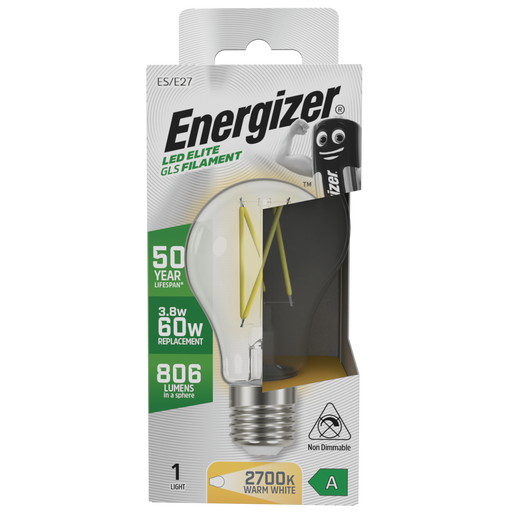
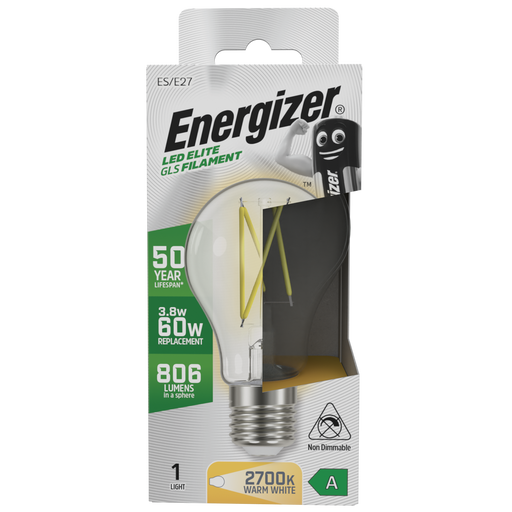
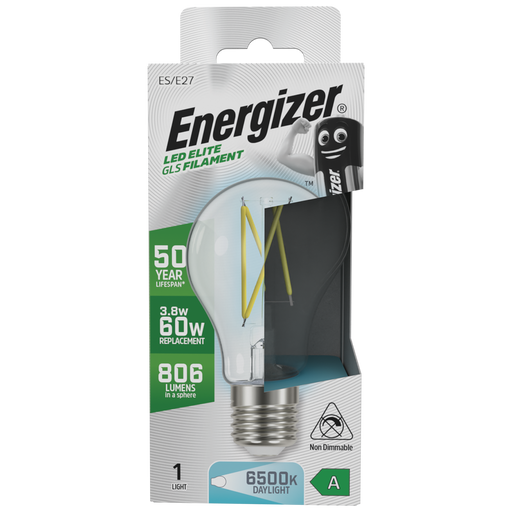

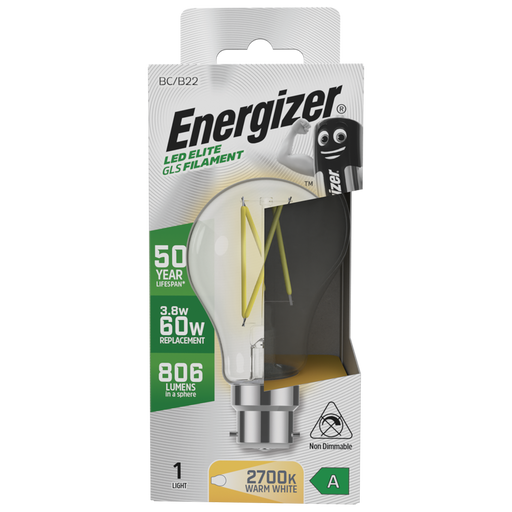

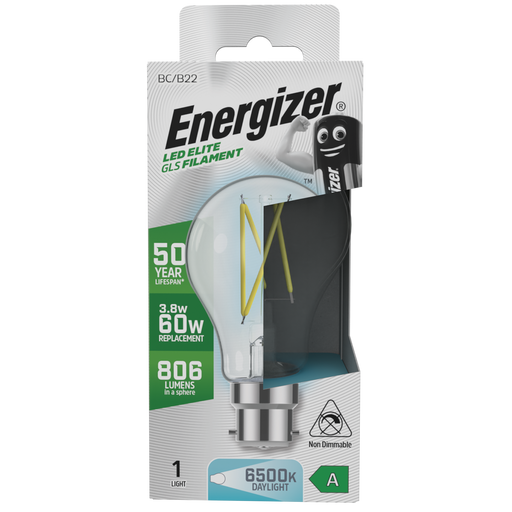

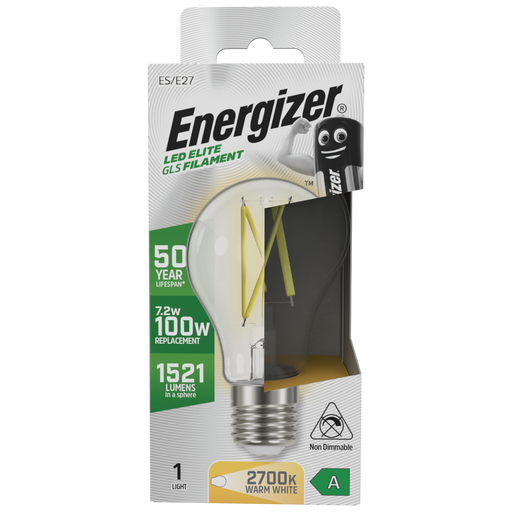

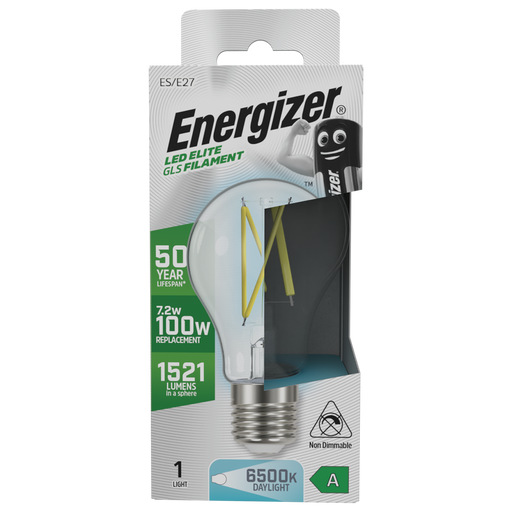

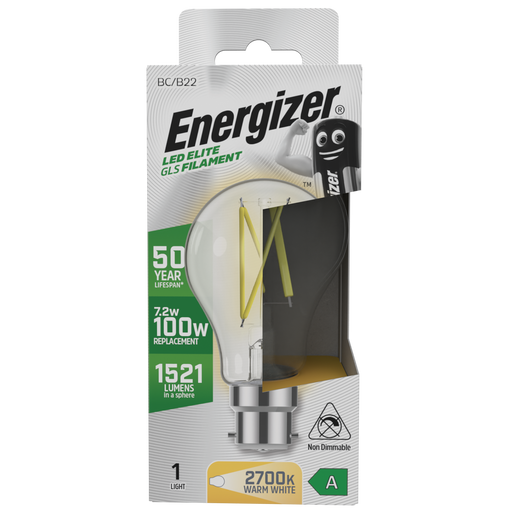
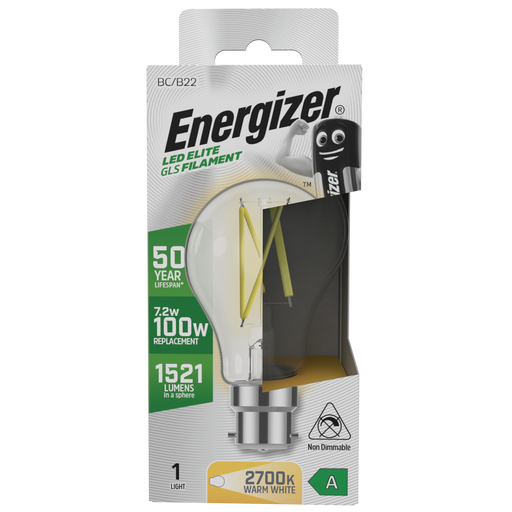
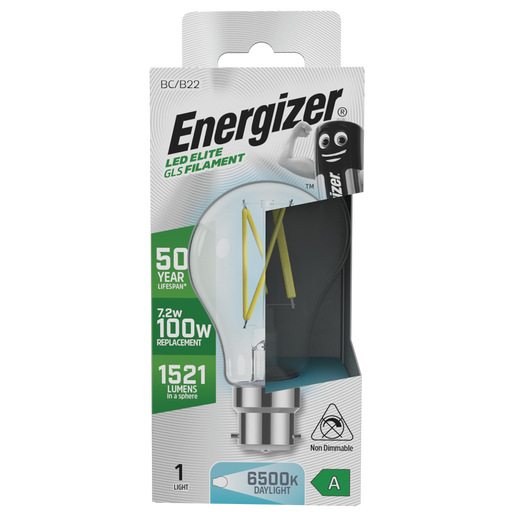
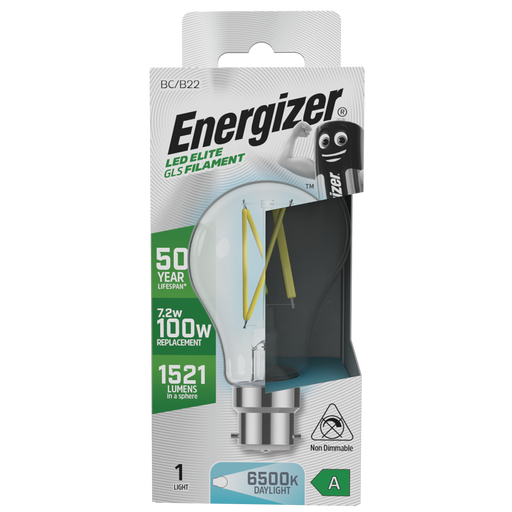
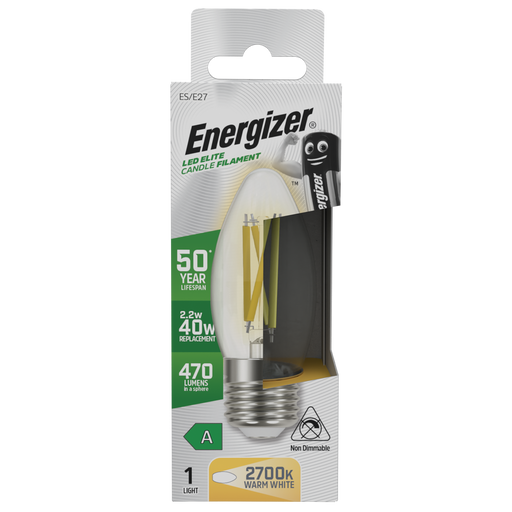
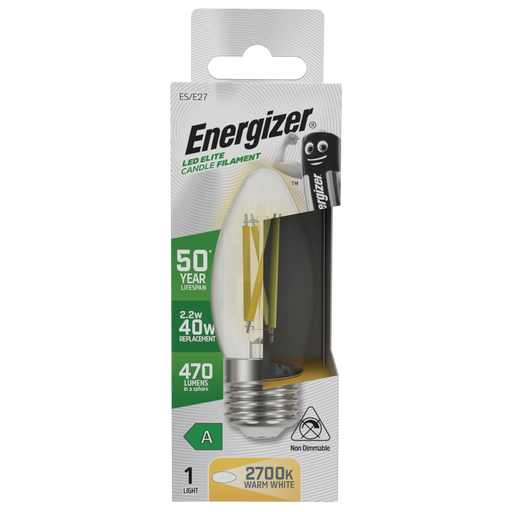
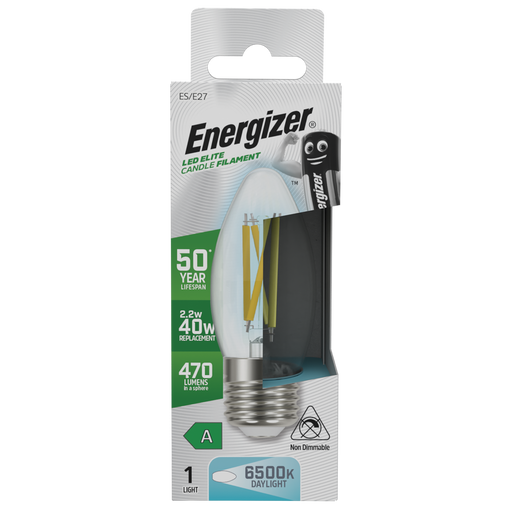
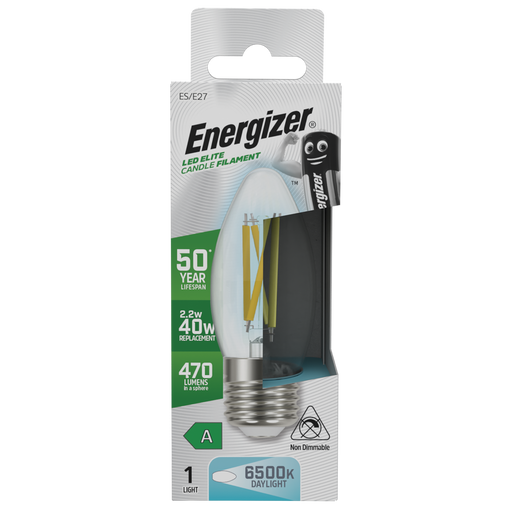
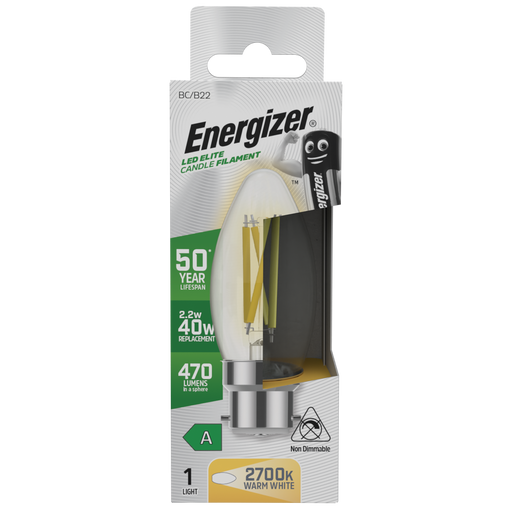
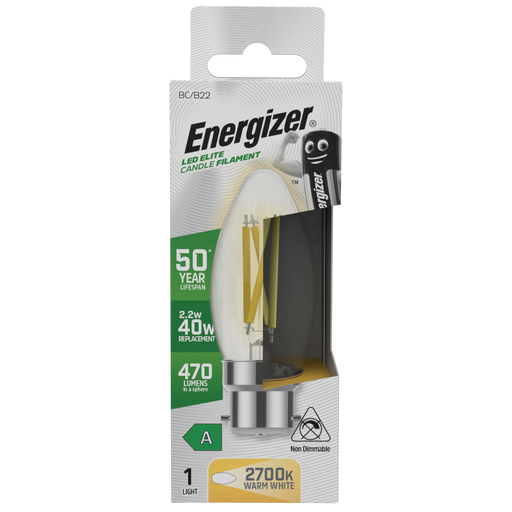
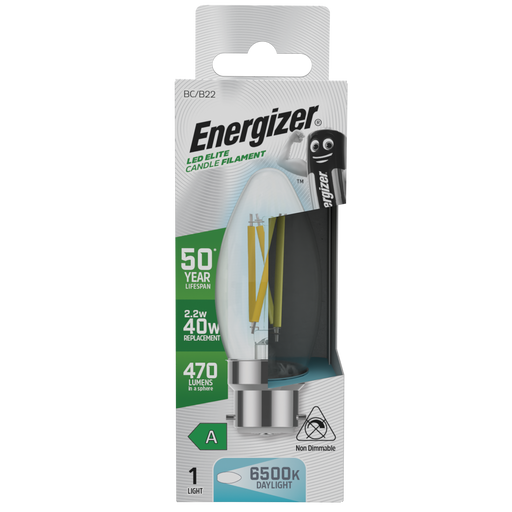
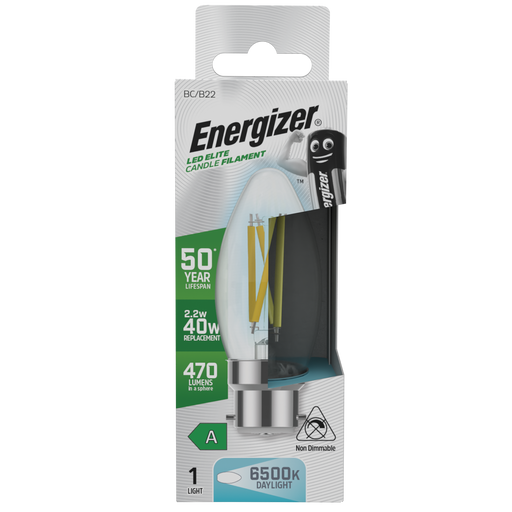
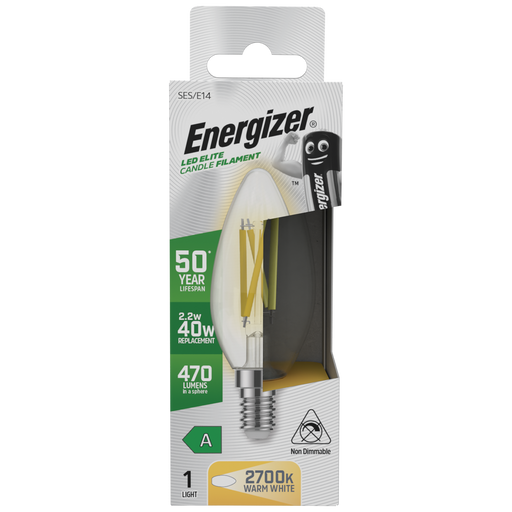
Leave a comment